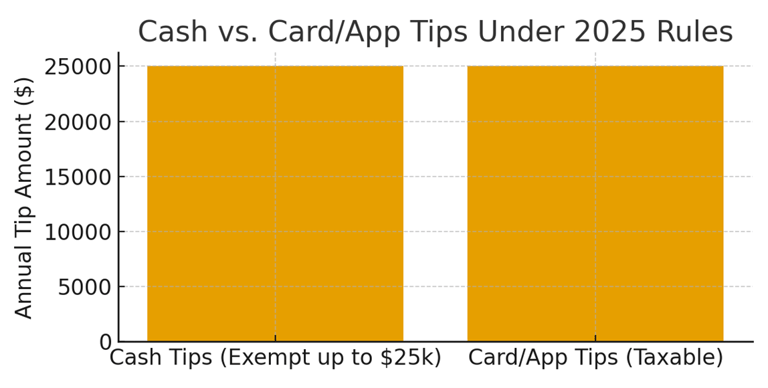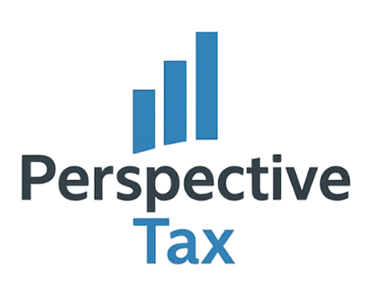No Tax on Tips Law
For as long as anyone can remember, tips were taxable. Servers, bartenders, bellhops, and stylists all knew the drill: declare your tips, pay tax on them, and hope you didn’t underreport in case of an audit.
T. Brown
9/1/20254 min read


For as long as anyone can remember, tips were taxable. Servers, bartenders, bellhops, and stylists all knew the drill: declare your tips, pay tax on them, and hope you didn’t underreport in case of an audit. That all changed in 2025 when Congress passed the 'No Tax on Tips' provision within the OBBBA legislation. Suddenly, up to $25,000 of cash tips became federally tax‑free. The news sparked confusion, celebrations, and myths. Workers asked: Do I still report tips? What counts as 'cash'? Does this mean I can stop keeping records? In this article, we’ll bust those myths and explain the reality behind this historic change.
The law is simple on its face: cash tips under $25,000 are exempt from federal income tax. But simplicity in headlines doesn’t always mean simplicity in practice. Here are the biggest myths you’ve probably heard.
Myth #1: All Tips Are Still Taxable
Reality: Not anymore. Under the new law, cash tips up to $25,000 are excluded from taxable income. That’s a seismic shift. If you’re a bartender who makes $18,000 in cash tips a year, those dollars are yours to keep without IRS involvement. Anything above $25,000 still counts, but for most service workers, this exclusion covers the bulk of their tip income.
Myth #2: You Don’t Need to Keep Records
Reality: Keeping records is still crucial. Workers must track their tips to prove eligibility. If you earn $23,000 in cash tips, you’ll want logs, pay stubs, or point‑of‑sale reports to back up your numbers. The IRS isn’t taxing those dollars, but they’ll still want evidence that you fall under the exclusion cap.
Myth #3: Credit Card Tips Are Excluded Too
Reality: Credit card and digital app tips remain taxable. This distinction matters because tipping is shifting toward apps and cards. The law’s focus on cash tips favors industries and regions where cash is still king. In urban areas with mobile payments, workers may benefit less than in diners or salons where cash dominates.


Source: PerspectiveTax - 2025
Case Study: Maria the Waitress
Maria earns $28,000 in wages and $20,000 in cash tips each year. Before the law, her taxable income was $48,000. Now, her taxable income drops to $28,000 because her $20,000 in cash tips fall below the $25,000 cap. At a 12% tax rate, Maria saves about $2,400 annually. For her, that means catching up on bills and setting aside money for her daughter’s education.
Contrast Maria with John, a high‑end server in a big city who earns $40,000 in wages and $30,000 in tips, half cash and half credit card. Only his $15,000 in cash tips are excluded; the other $15,000 (from cards) remains taxable. His benefit is smaller, highlighting how the cash‑only restriction creates winners and losers.
Pros
Directly benefits millions of lower‑income service workers.
Encourages honest reporting of cash tips.
Easy to understand: up to $25k in cash tips is tax‑free.
Cons
Unequal treatment of cash vs. card tips creates fairness issues.
Potential IRS enforcement challenges in verifying records.
Federal revenue loss, raising budget questions.
Why It Matters
The service economy employs millions, and tips aren’t a luxury—they’re survival income. For a server living paycheck to paycheck, keeping an extra $2,000 or $3,000 per year is the difference between debt and stability. Politically, the law signals recognition of tipped workers’ struggles. But its design also sparks debate: should tax benefits depend on whether a customer uses cash or a card? That’s a policy conversation likely to continue.
For now, workers should embrace the benefit while staying diligent about records. Knowing what’s exempt—and what isn’t—will ensure they maximize savings without IRS headaches.
Key Takeaway:
The No Tax on Tips law breaks old assumptions by exempting up to $25,000 of cash tips, but it leaves card-based tips taxable—creating relief for many and frustration for others.
Opinion: No Tax on Tips – Relief or Relic?
The 'No Tax on Tips' provision of 2025 is revolutionary in scope: up to $25,000 in cash tips are now excluded from taxable income. For millions of service industry workers, this feels like long-overdue relief. But in my opinion, the design of this law reflects a 20th-century economy more than a 21st-century one.
Let’s start with the positives. Workers in restaurants, salons, hotels, and delivery services often live paycheck to paycheck. Exempting their cash tips from federal income tax allows them to keep more of what they earn, providing real breathing room. For someone making $18,000 in tips, this could mean hundreds of dollars in annual savings. It’s also politically symbolic: for once, the government is acknowledging tipped workers in a way that prioritizes their financial stability.
But the elephant in the room is the shift to digital payments. Increasingly, customers tip through credit cards, apps, or online platforms. These tips remain fully taxable. By drawing a hard line between cash and digital, the law unintentionally rewards workers in cash-heavy industries while leaving out those whose clientele prefer cards or apps. In practice, this may divide service workers into 'winners' and 'losers' based on nothing more than payment method.
There’s also an equity question. Cash-heavy businesses already face more opportunities for underreporting. By exempting cash tips, the IRS may actually encourage more off-the-books income, reducing federal revenue and eroding tax compliance norms. Meanwhile, digital workers shoulder the tax burden.
In my opinion, if the goal is to support service workers, the exemption should apply to all tips—regardless of how they’re paid. Limiting relief to cash tips is outdated and unfair in today’s digital economy.
Ultimately, the No Tax on Tips law is a political win but a policy half-measure. It helps some workers meaningfully while entrenching inequities for others. Policymakers should revisit the design to ensure the spirit of relief matches the realities of modern tipping culture.
Citation
Kiplinger. “No Tax on Tips Bill Approved.” Kiplinger, 2025. https://www.kiplinger.com/taxes/no-tax-on-tips-2025

